Hey all–I wrote this before the devastation back East and neighboring states really started unfolding. Our thoughts are with all of you who are dealing with this.
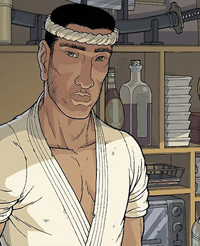 The “Book of the Month” feature is, for me, easily one of the most obvious ways that iFanboy really has opened my mind to different kinds of books and stories. Whether it be a quirky independent trade or the surfboard-like Wednesday Comics compilation, the Book of the Month exposes all of us to books that, frankly, we’d probably miss when visiting our LCS or scanning Amazon.
The “Book of the Month” feature is, for me, easily one of the most obvious ways that iFanboy really has opened my mind to different kinds of books and stories. Whether it be a quirky independent trade or the surfboard-like Wednesday Comics compilation, the Book of the Month exposes all of us to books that, frankly, we’d probably miss when visiting our LCS or scanning Amazon.
Of course, depending on your schedule, you might have the same problem as I do: look at the book, by the book, page through the book when it arrives, and put it on your bookshelf. (Repeat a few months later.) Makes sense, right? I still need to build some kind of podium for the DC Comics 75th Anniversary/house foundation tome, and as awesome as the recent Chris Ware book is, I am going to need to get a bigger table to figure out how to read it (a great problem to have—the “book” is amazing). But even for other books that actually fit on a normal shelf it can be hard to make time to really sit down and enjoy reading them.
Turns out, the Book of the Month is why they invented vacations.
I just got back from an honest-to-goodness trip that did not involve a holiday or a wedding or a conference or a convention — just a full-on, “forget about my life and do what I want”-style vacation. (For those of you who are curious about the trip, I’ll post photos to flickr and Facebook, we went to Baja and stayed in Todo Santos and near San Jose Del Cabo.) Thanks to my transition to digital comics, I was able to save precious backpack and suitcase space and take along quite a few books, most of them Picks of the Month, and actually read them. I figured with the holidays coming along, you might find my reactions useful as you think about cool books to give to your family and friends.
First off was Get Jiro!, written by Anthony Bourdain and Joel Rose, with art by Langdon Foss. I hadsome fairly heady books ahead of me, so I wanted to start off my vacation reading with a full-on escape, and this book completely and utterly delivered. While the overall story itself is pretty standard (quiet hero gets tempted by two competing forces who want to take advantage of his incredible powers), the specifics of the story are so clever, so well thought out and imaginative, that it becomes really hard to put this book down. Ron’s effusive review captures much of what I liked, so I will not re-hash his words, but suffice to say, I found this exploration of what happens when a single…trend? meme? aspect of life, we’ll say overtakes every thing else just ridiculously engaging.
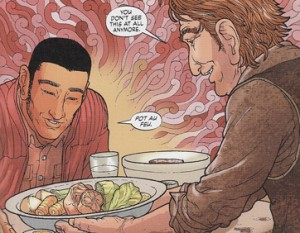
Basically, the story takes place in a world where food is it. No movies, no TV, no books…all of society’s entertainment and social involvement is around restaurants and food. It’s a place where thugs stop beating up a guy because they find out he has a reservation at a particular restaurant and are just thrilled for him, helping him back up and hoping that he has a great time, one thug exclaiming that he has been on the waiting list for years to eat there. It’s one of those single-conceit stories that could easily be tiring, but it’s handled in such a way (that is, the authors don’t play all their cards at once, the madness of the world unfolds though out the story) that the more you read, the more thrilling it gets, just because the world of food touches all of us in so many ways. And, of course, the crazier the reality gets in the book, the more you realize how silly obsessions like this can be in real life.
Langdon Foss kills it on art here, with a stylized but oddly realistic take on a world that hearkens Geoff Darrow’s detailed work on Hard Boiled. Rose really does it all here, handling complicated cityscapes, vehicles, sushi and beheadings with the same kind of ease and grace and that Jiro has preparing his dishes. Interestingly, I thought about this book a lot while on my vacation because it made me pay a lot more attention to the food I was eating throughout the trip (we had some really great meals) — I appreciated the different ingredients and presentation far more than I would have had it not been for the Rose’s fantastic renderings of, well, food. Which sounds weird, I know, but that’s kind of the magic of this book: it’s both a wickedly imaginative fiction and a love letter to a well-prepared meal. So: a great way to start my trip. I don’t know if there is one planned, but I think a sequel is in order, preferably before I get on a plane again.
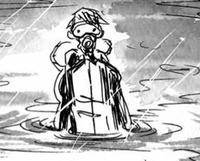 After Get Jiro, I turned to Jeff Lemire’s The Underwater Welder, which, to be completely honest, I had picked up initially because I thought it was a new book from Matt Kindt! This meditation on fatherhood, relationships and letting go apparently took Lemire several years to get through (there are a few pages dated 2009); indeed, he starts off his epilogue almost apologize for how long it took to get it done.
After Get Jiro, I turned to Jeff Lemire’s The Underwater Welder, which, to be completely honest, I had picked up initially because I thought it was a new book from Matt Kindt! This meditation on fatherhood, relationships and letting go apparently took Lemire several years to get through (there are a few pages dated 2009); indeed, he starts off his epilogue almost apologize for how long it took to get it done.
Damon Lindeloff’s introductions likens the book to an episode of The Twilight Zone, and I think his comparison is a good (if maybe too easy) one — though this episode really could have used an editor. This is not a bad book by any means, but like a friend remarked, it sounded like Lemire was a bit distracted — you have the feeling that Lemire “got through” as opposed to “finished” this story. There are plenty of double page spreads that, while big, are not all that impressive — the artwork throughout feels simplistic and rushed, and we’re talking Jeff Lemire here, who already has a very simple (though heartbreakingly effective) quality to it.
The story of Jack Joseph, nervous father-to-be who is haunted by images of his late father on the anniversary of his death, is an engaging one and there are some really great scenes, but the book struck me as hitting the same note over and over. Jack is a sympathetic character to be sure, but mid way through the story, you just want him to man up and take control of his life already, you know?
I can see that Lemire’s art can be polarizing (it took me awhile to get used to it when I first read Essex County, another Book of the Month, years ago), there’s an honesty to his sketchy lines that I find really amazing much of the time. Here, I was distracted by just how loose it was. There are pages that look like he was on the phone while drawing them, and there are several examples where it was clear that he was using photoshop to shrink faces to fit in a panel. Usually this would be fine, but it doesn’t work, art-wise–you end up with a person in the distance having far more facial detail than someone much closer to the camera. There are lots of two page sketches here and, with the exception of some very nice birds-eye view of the town, most of them, to me, seem kind of ham-fisted. Even the ending seemed like a compromise to end the book in an unexpected way and, to my mind, oddly unsatisfying. Who knows? Maybe after experiencing the wonderfully detailed, brilliantly colored art and high concept fun in Get Jiro!, going to this moody, cold and grim world was just too much of a shift?
Whatever my misgivings were with The Underwater Welder, I did appreciate many aspects of it,including the way it jumped between different timelines and realities, with some great panel work and cool transitions. There were some great non linear moments, which prepared me, perfectly, for the jaw-droppingly good Jim Henson’s Tale of Sand, by Jim Henson & Jerry Juhl with art by Ramon Perez. I had bought this book back in February, but knew the moment I paged through it that I wanted to really spend time with it, like I did with Asterios Polyp. This book was well worth the wait!
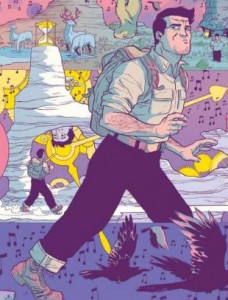
Tale of Sand is the graphic novel adaptation of the screenplay of the same name by the late Jim Henson and his creative partner, Jerry Juhl. It had gone through three revisions, until the early 70s
, but had been forgotten about until a few years ago. As Josh writes in his review, this is the kind of book that get more impressive the longer you spend time with it, the longer you think about it.
I read this book on the beaches of Baja California, ocean waves pounding the surf, surrounded by cacti and desert plants. This dichotomy, ocean and desert colliding, turned out to be a great place to read this story, which ostensibly takes place in the desert, but everywhere else at the same time. The non-lineary storytelling that Lemire was playing with served as a great foundation for this existential journey of our hero, Max, who is thrust into a story that really never stops for a breath. Like the sheriff suggests: stick to the map and you should be okay…just don’t trust the map.
Again, going back to Josh’s review, “the first and more important reason” to grab this book is to experience Perez’s art. It’s very easy to make comparisons (the work reminded me of a glorious mashup of David Mazzuchelli’s work in Asterios Polyp and Darwyn Cooke’s art), but it really just stands on its own as one of the most beautiful books of the year. (This is a dark horse entry for the Book of the Year.) I was at first a bit worried when I realized that this was mostly a silent book, but, as I write this hundreds of miles away, I realize that the word bubbles would just distract from the story. There are words here, and they are important, but they serve more like dialogue cards in silent films, marking plot transitions, giving you a second to breathe.
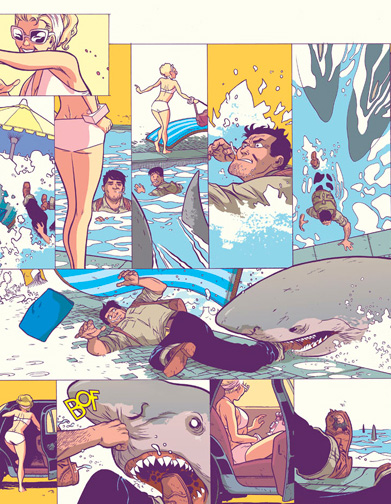 Both Underwater Welder and Tale of Sand reminded me of one thing I think comics do better than any other medium: explode narrative conventions. There is no medium that allows you to tell such a variety of different stories, describe so many different points of view with such economy of space and time. Comics can describe the past, present, and future on a single page. Comics can upend expectation and sequence in ways that other sequential narrative mediums cannot. Film goes from frame to frame, prose books take you from page to page. Comics can show you all the frames, all the pages, all at once.
Both Underwater Welder and Tale of Sand reminded me of one thing I think comics do better than any other medium: explode narrative conventions. There is no medium that allows you to tell such a variety of different stories, describe so many different points of view with such economy of space and time. Comics can describe the past, present, and future on a single page. Comics can upend expectation and sequence in ways that other sequential narrative mediums cannot. Film goes from frame to frame, prose books take you from page to page. Comics can show you all the frames, all the pages, all at once.
I could go on and on about Jim Henson’s Tale of Sand, but just read Josh’s review. I will say that no other book had people slow down while they peeked at what I was reading, no other book’s colors leapt off the page in bright Mexican sun like this one. This is a special book and you should make sure you put it on your holiday wish list.
So now my vacation from life — and weekly comics — is over, but I don’t have those nagging “oh, I wish my vacation was longer, I didn’t do ___ and ___” thoughts. I got what I needed: a break from real life and a chance to energize myself for the rest of the year, both for work and, in a way, for comics. Yes, it’s nice to plow through a big stack of comics during a break, but it’s just as awesome to take in a few solid books that help remind you just how incredible comics can be. My frustrations with The Underwater Welder notwithstanding, I was really inspired by these trades and highlighted the kind of creative storytelling that make today’s comics so refreshingly different than anything else out there.
Let us know what you suggest for our winter vacation reading! Winter is coming, you know!
Mike Romo is an actor living and working in Los Angeles.


Taschen sells a bookstand that will fit all their big XL books like DC Comics. Not that expensive either, and you’ll feel like you have some fancy illuminated manuscript in your house! =)
I really need to get Tale of Sand. Been on my list for a while now, and just looks great.
Yes, you do, sir. Yes, you do.